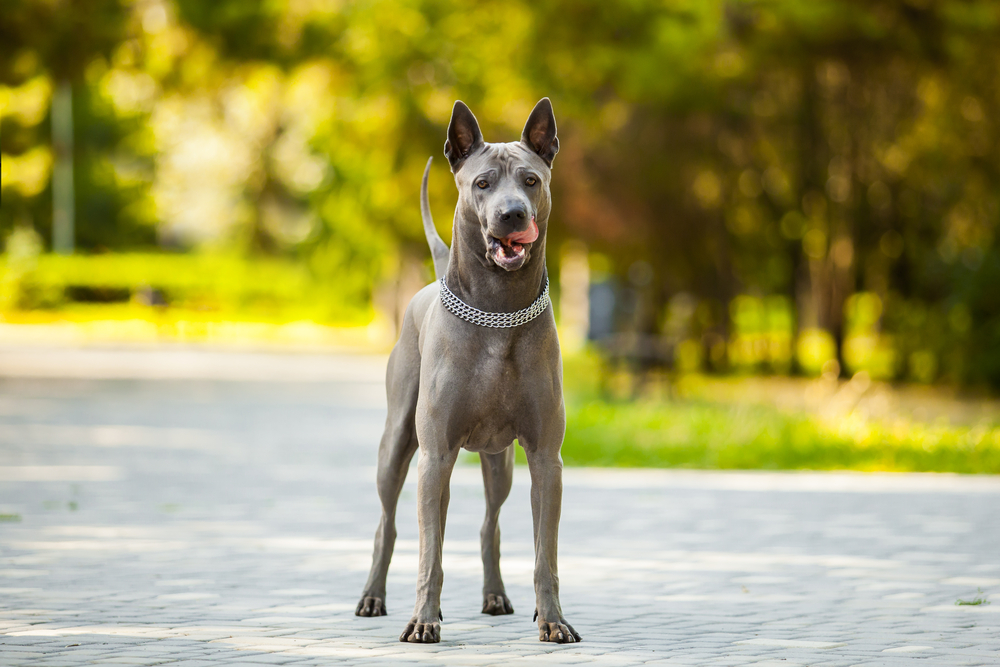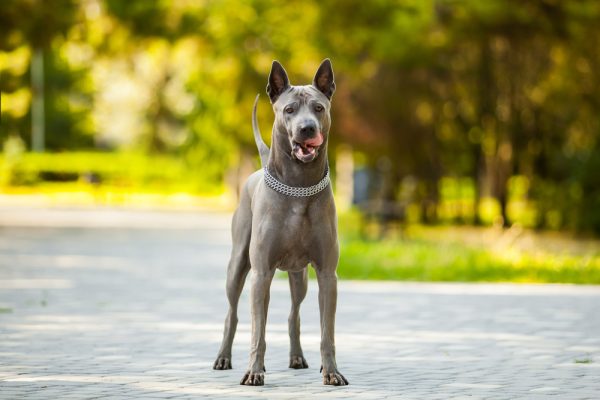Click to Skip Ahead
Thai Ridgebacks are gorgeous, medium-sized, athletic dogs with sleek muscles and elegant lines. They’re agile, intelligent, tough, and naturally gifted when it comes to protecting and guarding. At the same time, they’re incredibly loving and can make wonderful companions. Keep reading to learn more about these fascinating dogs.
Breed Overview
Height:
20–24 inches
Weight:
35–75 pounds
Lifespan:
14–15 years
Colors:
Red, black, blue, and fawn
Suitable for:
Experienced dog owners looking for an intelligent, athletic, and natural guardian
Temperament:
Intelligent, independent, loving, loyal, and protective
Thai Ridgebacks are considered an ancient breed. They lived for thousands of years alongside humans while breeding primarily on their own, and they naturally developed their hunting, guarding, and protecting skills.
Thai Ridgeback dogs can make great pets under the right circumstances, but they are suspicious of strangers and quick to switch into high gear without solid socialization and training. They’re best suited for those with lots of experience with dogs.
Thai Ridgeback Breed Characteristics

Thai Ridgeback Breed Puppies
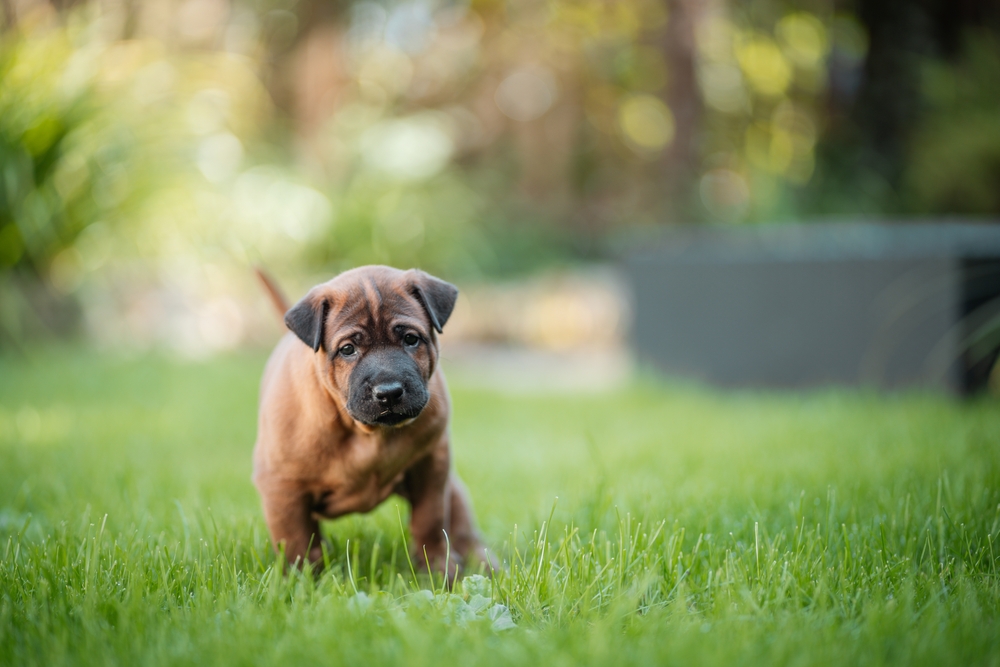
Thai Ridgeback dogs are relatively rare outside of Thailand, but there are breeders worldwide working with them. It may be possible to locate Thai Ridgebacks through rescue organizations if you’re interested in adopting an adult dog, but puppies will be harder to locate.
Solid early training and socialization are essential for Thai Ridgeback puppies. Without both, they run the risk of becoming aggressive toward strangers and difficult to manage, which can be problematic in dogs that are this smart, independent, and protective.
Because Thai Ridgebacks are so intelligent and accustomed to making decisions independently, it’s best to start training them when they’re young, before they start learning unwanted habits that can be difficult to break.
Early socialization helps puppies become comfortable and learn how they’re expected to behave in different situations, which allows them to grow into adult dogs who can manage their behavior appropriately.
Puppy classes that provide systematic exposure to various situations dogs are likely to encounter are helpful for early socialization.
Thai Ridgeback Breed Origin & History
Thai Ridgeback dogs are native to a series of remote islands in eastern Thailand and have likely been around for more than 4,000 years. As primitive dogs, they weren’t subjected to human selection for breeding.
Many ancient breeds from around the world share physical traits like ears that stand straight up. Thai Ridgebacks were mostly used as guard dogs and watchdogs but also hunted creatures such as snakes. They’re currently part of the American Kennel Club’s Foundation Stock Service program.
Temperament & Intelligence of the Thai Ridgeback
Thai Ridgeback dogs are incredibly intelligent and independent, which, combined with their strong hunting, guarding, and protecting instincts, can make them a bit challenging to manage.
They can be unwelcoming toward people they don’t know and aggressive if they feel someone they love is in danger. They make fantastic watchdogs and aren’t usually prone to becoming nuisance barkers.
With solid socialization, they can become loyal companions, particularly for owners with extensive experience with dogs. Although they’re great family dogs, they usually pick a favorite family member and establish a stronger bond with them.
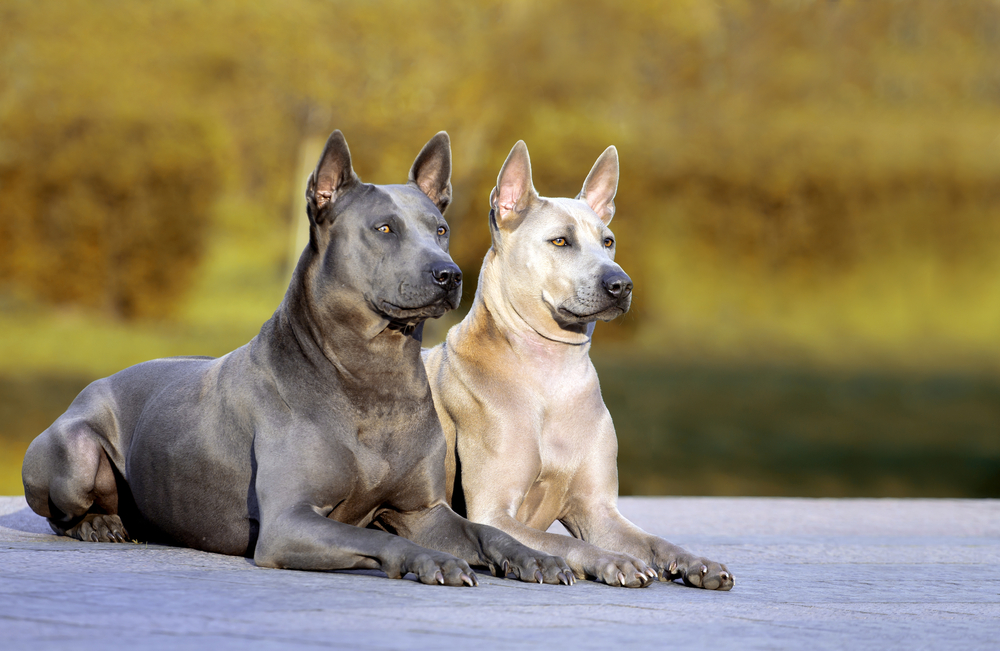
Are These Dogs Good for Families? 👪
Thai Ridgeback dogs are loving and loyal. They usually get along well with children, particularly older kids with whom they grow up or spend lots of time. Keep in mind that dogs should always be supervised when around children to ensure that interactions stay fun and safe.
Does This Breed Get Along With Other Pets? 🐶 😽
Thai Ridgeback dogs have high prey drives and are natural hunters, so they have trouble getting along well with other animals. They have difficulty behaving around other dogs without good socialization and can easily be tempted to go after cats.
Although the Thai Ridgeback can learn to tolerate other animals, they’re happier when they’re the only pet.
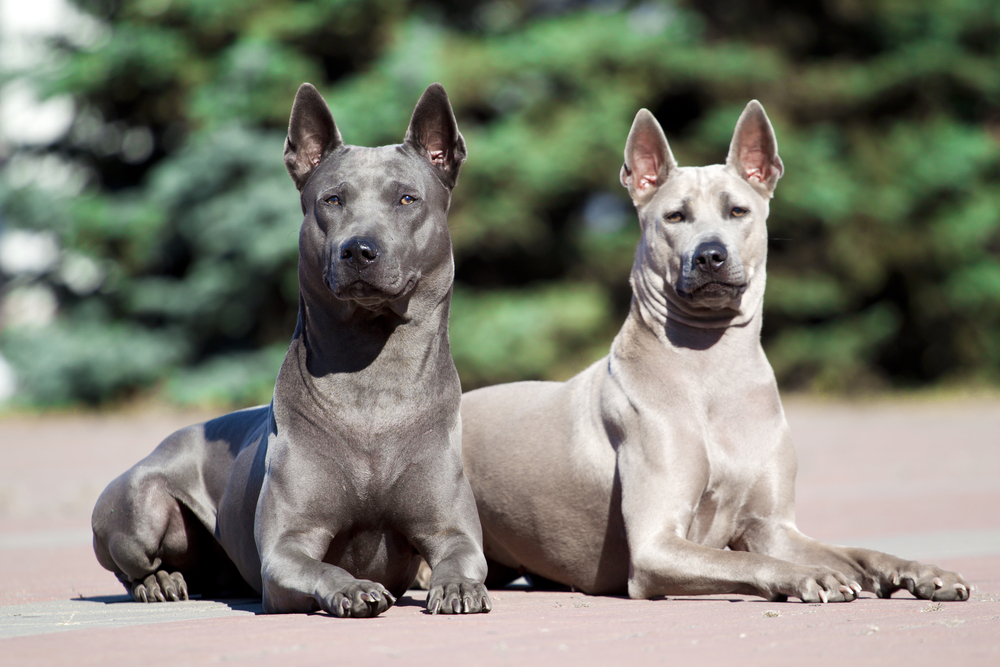
Things to Know When Owning a Thai Ridgeback:
Food & Diet Requirements 🦴
Like all dogs, Thai Ridgebacks have specific nutritional requirements. An easy way to ensure these needs are met is to feed them commercial dog food that features the Association of American Feed Control Officials (AAFCO) nutritional adequacy statement.
You can also contact your veterinarian for feeding tips and brand recommendations.
Puppies should eat products specifically formulated for them to ensure they get the extra protein and calories they need while growing.
Treats should be limited to about 10% of their diet to prevent excessive weight gain. Measuring their food is a great way to ensure your dog gets just the right amount of food to meet their nutritional requirements.
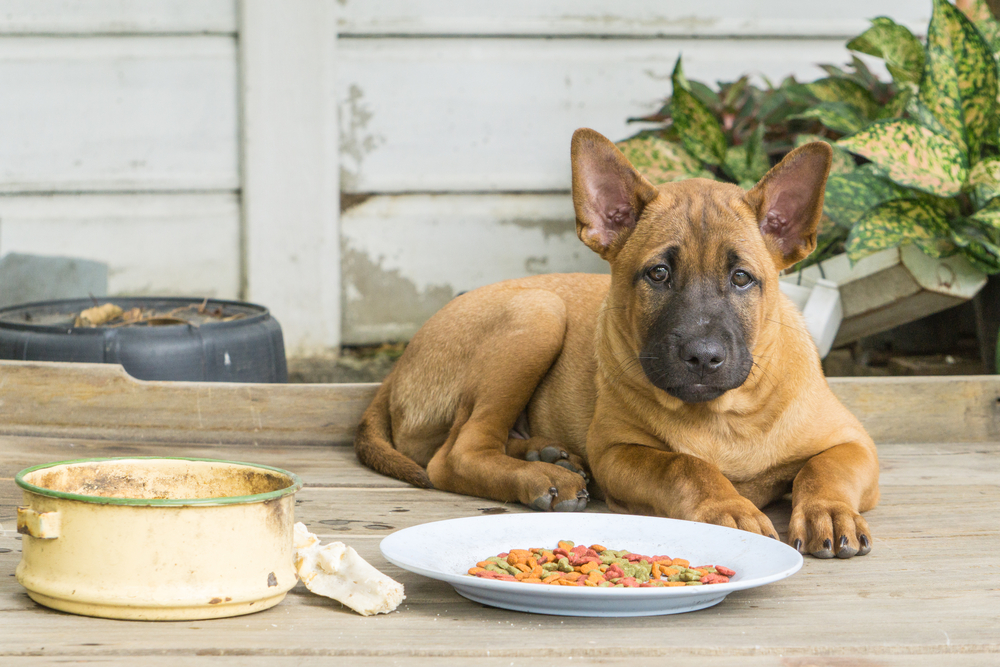
Exercise 🐕
Thai Ridgebacks need at least an hour of daily physical activity, and they generally do well when they can go on multiple daily walks. Swimming, playing fetch, and playing frisbee are also excellent activities for these active dogs.
When Thai Ridgeback puppies are young, they should not engage in intense exercise because their bones and muscles are still developing.
Training 🎾
Solid training is vital for Thai Ridgeback dogs, as they’re often suspicious of people they don’t know and can be fast to move into protective mode. They require socialization to ensure they can manage their protective instincts when meeting new people or navigating potentially triggering environments.
Because they’re smart and independent, Thai Ridgebacks can be challenging to train. However, experienced owners shouldn’t have any issues.
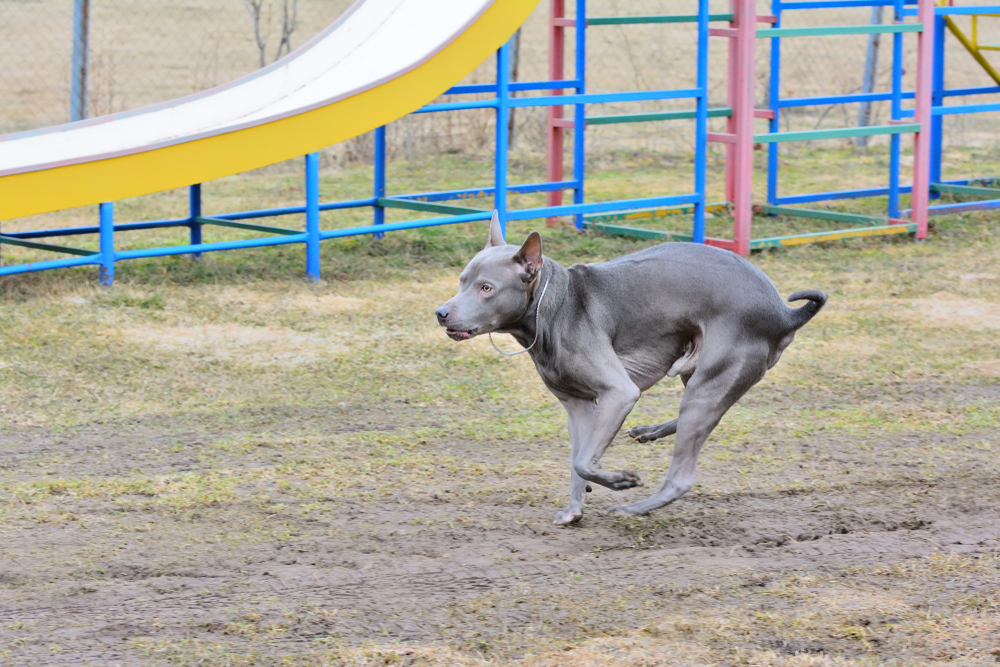
Grooming ✂️
Thai Ridgeback dogs have short coats that are relatively easy to groom. Weekly brushing is generally all that’s required to keep them looking good. They shed, so be prepared to brush their coats more frequently when the weather starts to warm up.
Their ears need to be regularly checked to make sure they’re clear of wax and dirt, and their nails also need to be trimmed. Like all dogs, they benefit from regular tooth brushing to remove plaque and tartar.
Health and Conditions 🏥
Thai Ridgebacks are healthy dogs. They live for 14 to 15 years, and most medium-sized dogs typically have lifespans that last 10 to 13 years. Thai Ridgebacks sometimes develop hip dysplasia, and dermoid sinus cysts can present problems.
Hip dysplasia occurs when a dog’s hip joint becomes lax due to imbalanced growth as a puppy. It also causes joint problems such as arthritis. Dermoid sinuses occur when a dog’s skin and nervous system don’t separate properly during development.
- Eye problems
- Hip dysplasia
- Dermoid sinus cysts

Male vs Female
Male Thai Ridgeback dogs are noticeably larger than their female counterparts. Male dogs generally reach heights of 22 to 24 inches, while female Thai Ridgebacks seldom grow to more than 22 inches. Factors such as genetics and upbringing are more influential than sex in developing the canine’s temperament.
3 Little-Known Facts About the Thai Ridgeback
1. They Don’t Like Cold Weather.
Thai Ridgebacks don’t do well when the mercury drops; their short coats are designed to keep them comfortable in hot, humid climates.
2. They have interesting tongues.
Although most dogs have pink tongues, Thai Ridgebacks have spotted or black tongues.
3. They can have different ridge patterns.
Thai Ridgebacks are known for the swirls of hair on their backs that grow in opposite directions from the rest of their coats. Adults usually have eight ridge patterns.

Final Thoughts
Thai Ridgeback dogs are stunning canines with their sleek muscles and gorgeous silhouettes. They’re an ancient breed that’s been around for thousands of years and developed primarily without being subject to human selection. In their homeland, they were used to guard and protect people and property, and they were prized for their hunting skills.
Although they make loving and loyal companions, they’re natural protectors, hunters, and guardians. They have high prey drives and don’t get along with other animals without good socialization. They’re also independent and wickedly intelligent, which makes them best suited for experienced dog owners.
Featured Image Credit: Sbolotova, Shutterstock

